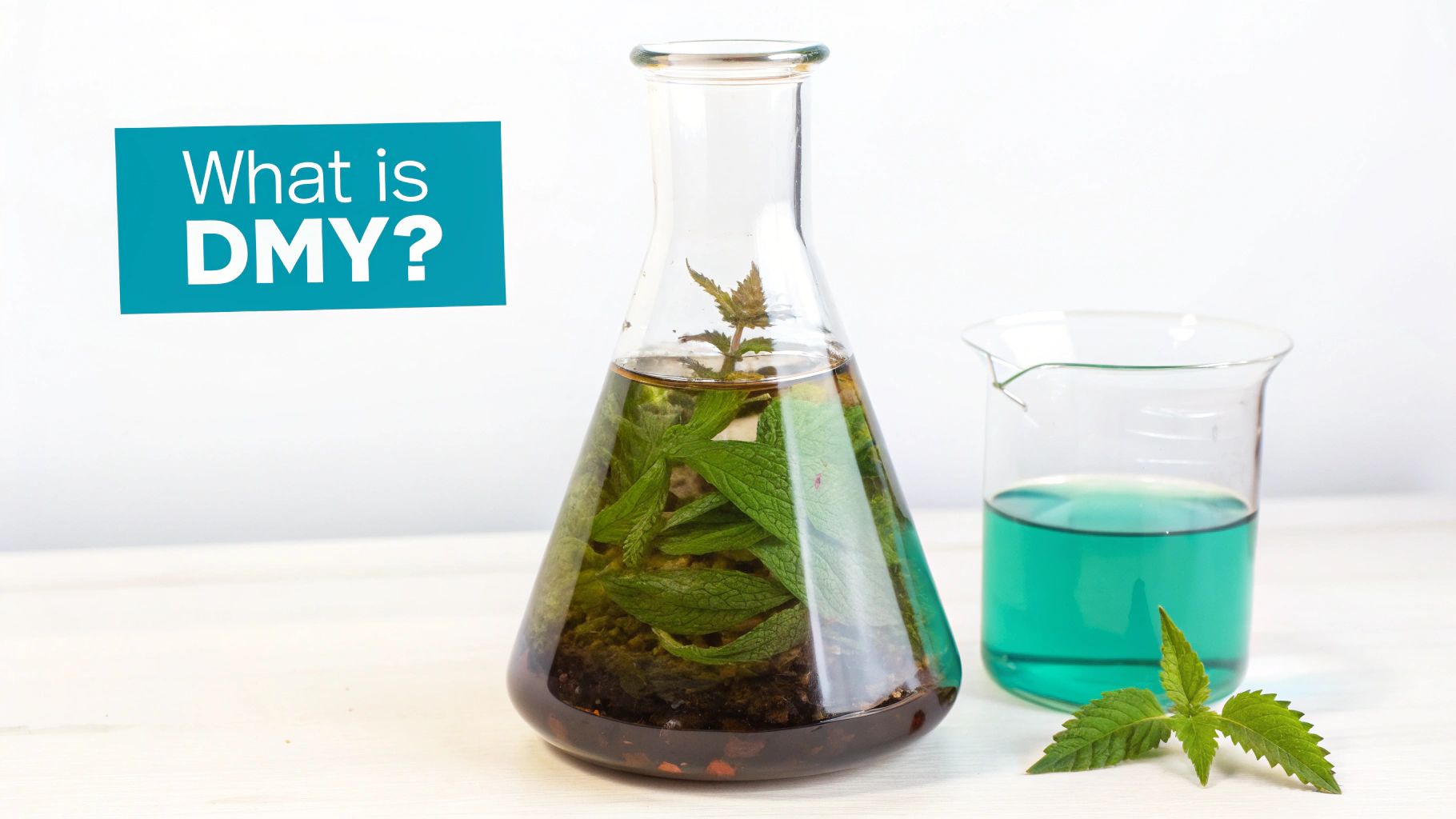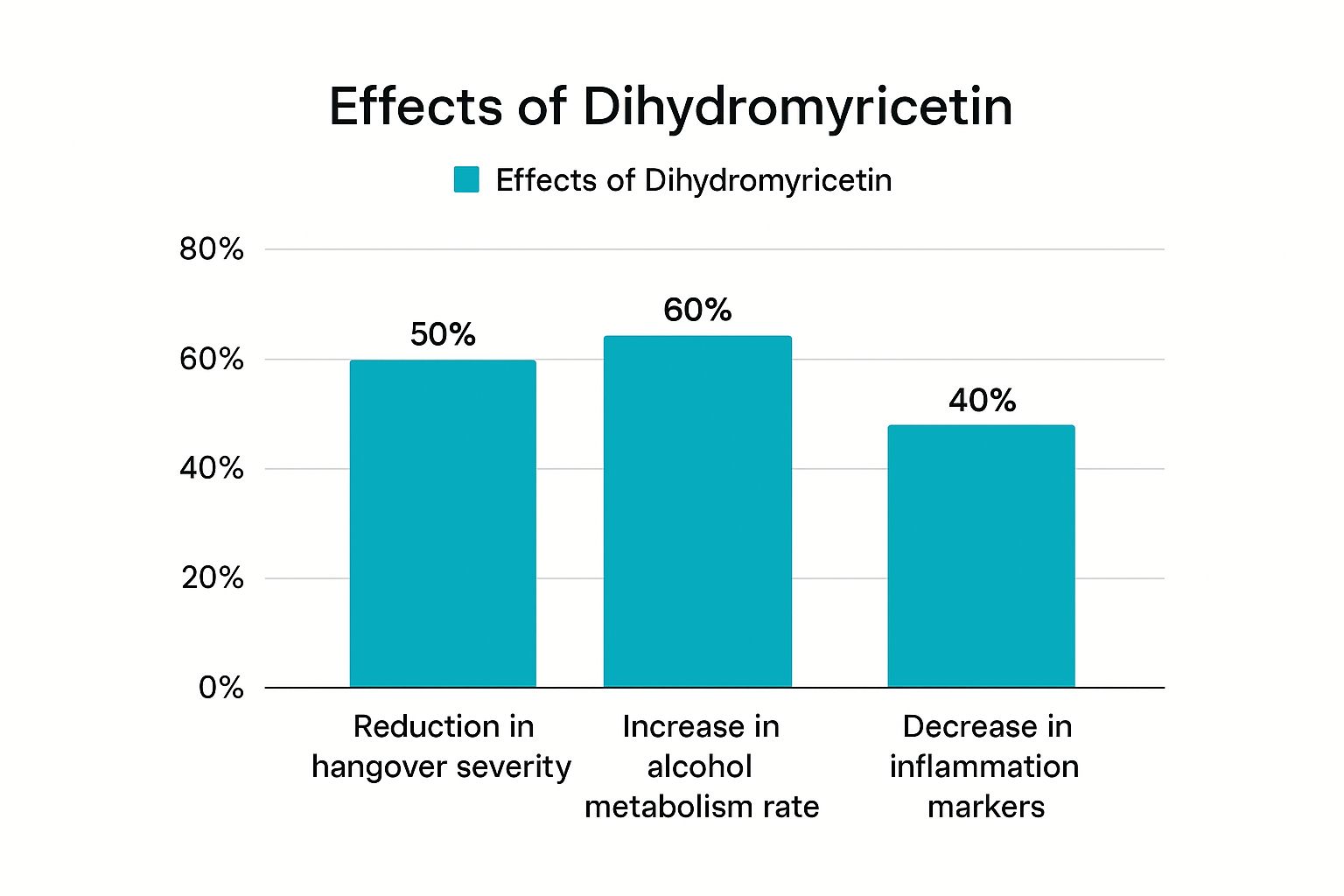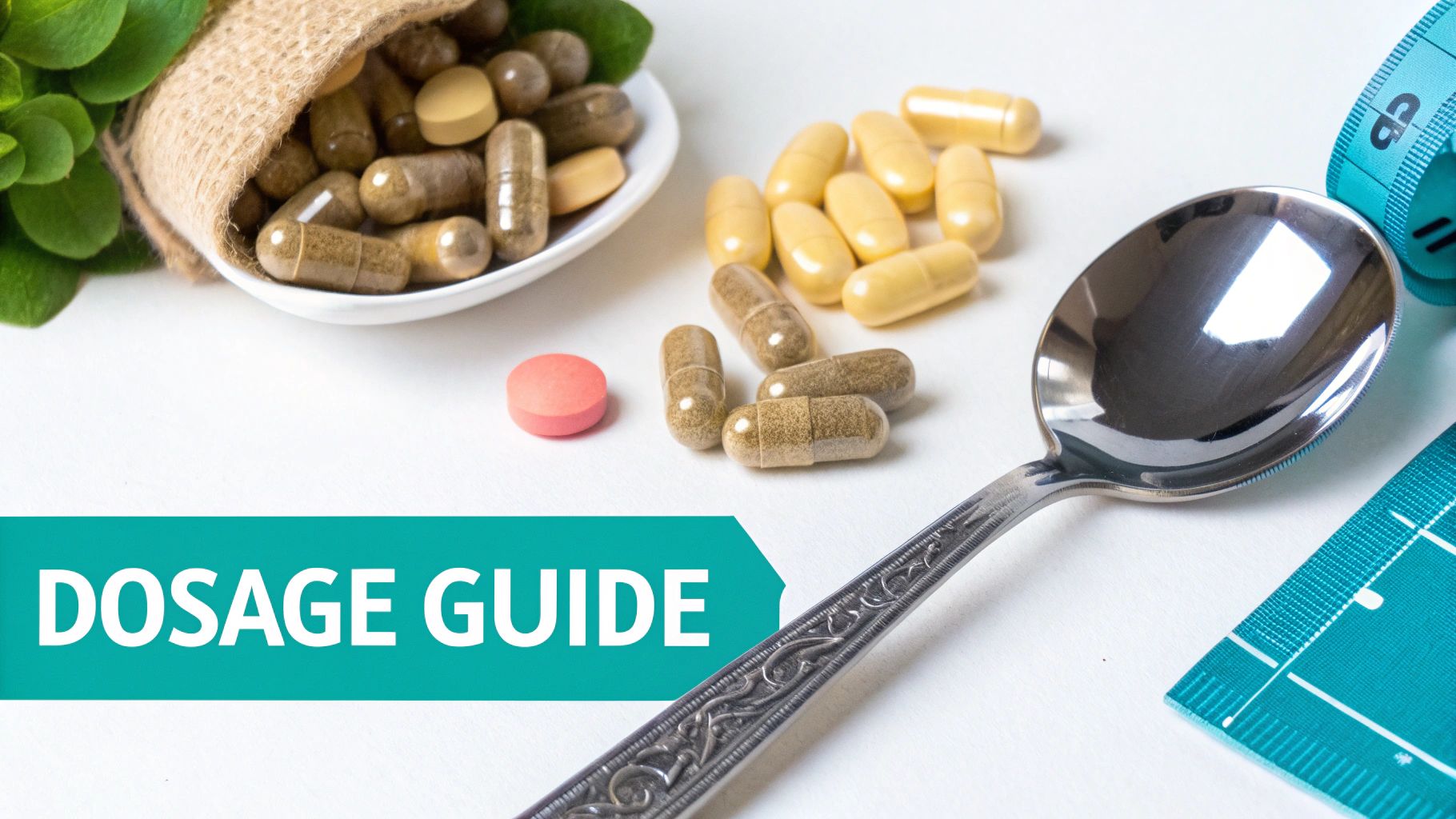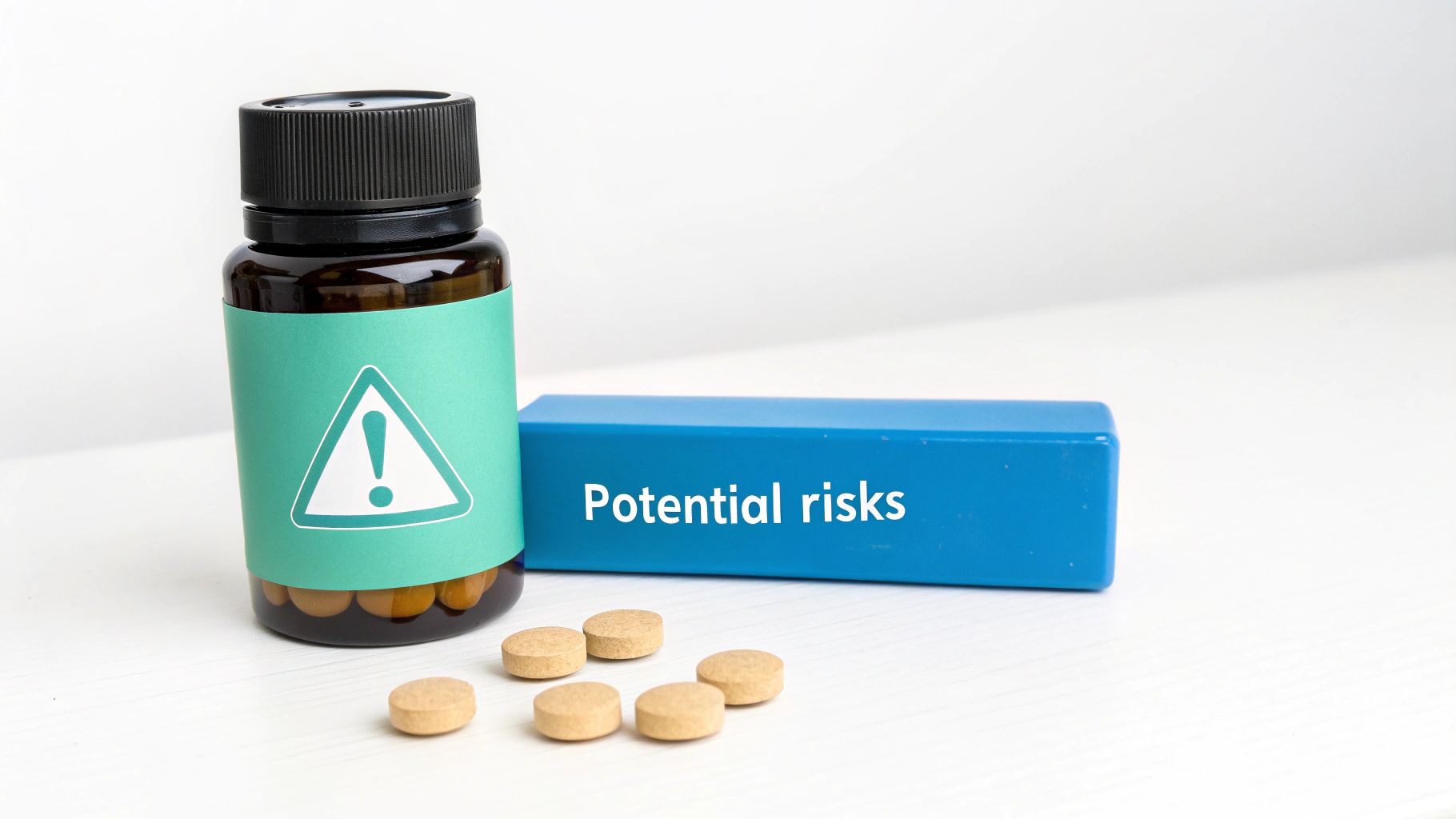

· By Annemarie
Dihydromyricetin For Hangovers: Your Science-Backed Solution
Understanding DHM: Ancient Wisdom Meets Modern Science

Dihydromyricetin (DHM) isn't just another supplement on the market; it boasts a rich history rooted in traditional Chinese medicine. Derived primarily from the Hovenia dulcis plant, this natural compound has been used for centuries to address the after-effects of alcohol. This naturally leads to the question: how did traditional practices pave the way for DHM's modern recognition as a potential hangover solution?
From Traditional Remedy to Scientific Curiosity
The story of DHM begins in ancient China, where Hovenia dulcis was recognized for its ability to ease hangover symptoms. Passed down through generations, it became a staple in traditional medicine. This long-standing traditional use piqued the interest of modern scientists, leading to research exploring DHM’s mechanisms of action.
This research aims to understand exactly how DHM interacts with the body to lessen hangover severity. Scientists are also investigating the potential long-term benefits of DHM. If you are building a blog and exploring platform options, WordPress is a popular choice.
DHM and Alcohol Metabolism: A Closer Look
A key area of DHM research focuses on its impact on alcohol metabolism. The liver plays a vital role in processing alcohol, and studies suggest that DHM may enhance this process. By supporting the liver's detoxification pathways, DHM might help the body eliminate alcohol and its byproducts more effectively.
This could potentially reduce the duration and intensity of hangover symptoms. Acetaldehyde, a toxic byproduct of alcohol metabolism, is believed to be a major contributor to these symptoms. DHM may help neutralize acetaldehyde, further minimizing its negative effects.
Dihydromyricetin (DHM), a flavonoid extracted primarily from Hovenia dulcis, has a long history of use in traditional Chinese herbal remedies for mitigating hangover and alcohol intoxication effects. The use of Hovenia dulcis as an anti-hangover agent dates back to the Tang dynasty (around the 7th century), documented in Tang Materia Medica, China's first pharmacopoeia. Clinical doses of Hovenia extracts for hangover treatment ranged from 100 to 650 mg/kg, with purified total flavonoids representing approximately 4.53% of the extract. Research indicates that DHM counteracts acute ethanol intoxication by increasing the activity of alcohol-metabolizing enzymes, alcohol dehydrogenase (ADH), and acetaldehyde dehydrogenase (ALDH), thereby facilitating alcohol elimination. Learn more about the history of DHM here.
The Future of DHM Research
While current research on dihydromyricetin for hangovers shows promise, more studies are necessary to fully understand its potential. This includes investigating the optimal dosage, long-term effects, and potential interactions with other medications.
This ongoing research is crucial for establishing clear guidelines for safe and effective DHM use. As research continues, DHM may become an increasingly valuable tool in managing the negative consequences of alcohol consumption and promoting overall well-being.
How DHM Tackles Your Worst Hangover Symptoms
The difference between a fresh start and a brutal hangover often depends on how your body processes alcohol. Specifically, it's about your liver's efficiency in clearing alcohol and neutralizing acetaldehyde, the toxic culprit behind many hangover symptoms. This is where dihydromyricetin (DHM) comes in. DHM boosts your liver's alcohol-processing power, helping you recover faster. For more on the science behind hangovers, check out this helpful guide: What Causes Hangovers?
Neutralizing the Culprit: Acetaldehyde
Acetaldehyde contributes significantly to nausea, headaches, and overall misery. DHM directly targets and neutralizes this toxin, minimizing its negative impact. This sets DHM apart from traditional hangover "remedies" like coffee or greasy food, which only mask symptoms without addressing the root cause. Coffee might provide a temporary energy boost, but it doesn't speed up acetaldehyde removal.
Boosting Liver Function
DHM not only neutralizes acetaldehyde but also enhances liver function. It boosts the activity of essential enzymes involved in alcohol detoxification, like alcohol dehydrogenase (ADH) and acetaldehyde dehydrogenase (ALDH). This faster processing clears alcohol from your bloodstream more quickly, reducing hangover duration and intensity.
Reducing Inflammation
Alcohol consumption can trigger body-wide inflammation, adding to hangover discomfort. DHM has anti-inflammatory properties, further easing symptoms. This three-pronged action – neutralizing toxins, boosting liver function, and reducing inflammation – makes DHM a powerful hangover management tool.
The following infographic compares DHM's effectiveness against other strategies, showing percentage improvements in hangover severity, alcohol metabolism rate, and inflammation markers.

As the data illustrates, DHM offers significant advantages. It shows a marked reduction in hangover severity, increased alcohol metabolism, and decreased inflammation, highlighting its potential as a truly effective solution.
To further illustrate these benefits, let's examine a comparison table:
DHM vs Traditional Hangover Remedies Comparison: A comprehensive comparison showing how DHM addresses hangover symptoms compared to common remedies.
| Remedy Type | Mechanism of Action | Symptom Relief | Evidence Level | Side Effects |
|---|---|---|---|---|
| DHM | Neutralizes acetaldehyde, boosts liver enzymes, reduces inflammation | Nausea, headache, fatigue, inflammation | Promising preclinical and clinical studies | Generally well-tolerated |
| Coffee | Stimulant, increases alertness | Temporary fatigue reduction | Anecdotal, limited scientific evidence | Jitteriness, anxiety, sleep disruption |
| Water | Rehydration | Dehydration symptoms | General consensus, basic biology | Minimal |
| Pain Relievers | Reduces pain and inflammation | Headache, body aches | Established efficacy for pain relief | Potential gastrointestinal issues, medication interactions |
This table highlights DHM's comprehensive approach compared to traditional remedies that address limited symptoms or only provide temporary relief. DHM offers a more targeted solution.
Timing is Key
Timing is crucial for maximizing DHM's effectiveness. Taking it before, during, or shortly after drinking allows it to work synergistically with your body. This proactive approach lets DHM neutralize acetaldehyde and support liver function before symptoms even start.
While more research is ongoing, current findings are promising. DHM's ability to target the root causes of hangovers, rather than just masking them, makes it a valuable option for mitigating the after-effects of alcohol. Enjoying a night out without the next-day consequences may finally be possible. Emerging research even suggests potential broader benefits like liver protection and support for healthier drinking habits.
Protecting Your Liver: DHM's Hidden Superpower
Beyond its ability to relieve hangovers, dihydromyricetin (DHM) offers significant liver protection, potentially changing how we think about alcohol consumption. This isn't simply about feeling better the next day; it's about protecting a vital organ. Let's explore the research that reveals how DHM shields the liver from alcohol-induced harm.
Understanding Alcohol's Impact on the Liver
Alcohol puts a strain on the liver, which constantly works to process and remove it. This continuous burden can lead to inflammation, fatty liver disease, and even more severe health problems. DHM acts as a protective agent, mitigating some of this harm. Think of it as a safeguard for your liver cells.
How DHM Supports Liver Health
DHM offers multiple layers of liver protection. It improves lipid metabolism, preventing fat accumulation in the liver, a common consequence of alcohol consumption. This means DHM helps the liver process fats more effectively. Additionally, DHM reduces inflammation, another key factor in liver damage. By lessening the inflammatory response, DHM fosters a healthier environment for liver cells to regenerate and function properly. Check out our guide on Milk Thistle for liver detox.
The Science Behind DHM's Protection
Recent scientific studies have measured the protective effect of dihydromyricetin against liver damage from excessive alcohol consumption—a crucial step forward for regions where alcohol-related liver diseases pose a substantial health risk. For example, a 2023 study on female mice given ethanol over five weeks showed that supplementing their diet with DHM at 6 mg/mL significantly improved ethanol-induced disruptions in lipid metabolism and decreased markers of liver injury. Alcohol-associated liver disease (ALD) affects millions worldwide, and currently, no effective pharmaceutical treatments exist beyond corticosteroids and liver transplantation. Explore this topic further here. DHM also benefits mitochondrial health within liver cells. Mitochondria are the powerhouses of cells, essential for energy production. DHM helps protect these vital organelles from the stress of alcohol.
Why Liver Protection Matters, Even for Occasional Drinkers
Even moderate alcohol consumption can still affect the liver. DHM’s protective qualities extend beyond heavy drinkers to anyone who occasionally enjoys an alcoholic beverage. This is about promoting lasting liver health and overall well-being, no matter your drinking habits. Supporting your liver consistently contributes to your general health.

DHM's liver-protective effects represent a possible shift in preventive medicine, particularly for alcohol-related liver issues. By supporting healthy liver function, DHM helps you maintain a healthier you, both now and in the future. This proactive approach moves beyond treating hangover symptoms to addressing a fundamental health concern.
Beyond Hangovers: DHM's Role In Alcohol Recovery
Dihydromyricetin (DHM) offers more than just hangover relief. Emerging research suggests it may significantly impact alcohol's effects, particularly cravings, withdrawal symptoms, and long-term recovery. This opens exciting possibilities for DHM in supporting healthier drinking habits and addressing alcohol use disorder.
Reducing Alcohol Cravings and Intake
Studies indicate DHM may reduce alcohol cravings and overall consumption. This has been observed in animal studies, where DHM led to lower alcohol intake. This potential benefit could be significant for those looking to moderate their drinking. By potentially reducing the desire for alcohol, DHM might offer a natural path towards healthier habits. Read also: Probiotics for Hangover
Easing Withdrawal Anxiety
Alcohol withdrawal can be challenging, often accompanied by anxiety and other distressing symptoms. DHM's potential to alleviate withdrawal anxiety is of particular interest to addiction specialists. Its impact goes beyond simple hangover relief. Studies highlight its effectiveness in reducing alcohol consumption, intoxication, and withdrawal symptoms like anxiety and seizures. Research from the University of Southern California (USC) demonstrated that DHM, administered to rats, lowered alcohol intake and mitigated acute intoxication effects. Importantly, DHM treatment showed anxiolytic properties, reducing alcohol withdrawal-induced anxiety—a major hurdle in recovery. By easing withdrawal discomfort, DHM may make recovery more manageable.
Supporting Long-Term Recovery
Because DHM may impact both cravings and withdrawal, it could be a valuable addition to long-term recovery strategies. This research area holds immense promise for those battling alcohol use disorder. Further research is crucial to fully understand DHM's long-term effects and its best integration into recovery plans. Beyond hangovers, AI and machine learning are used in various healthcare and other industry areas.
DHM and Brain Chemistry
DHM's effects on brain chemistry likely play a key role in influencing alcohol cravings and withdrawal. While the precise mechanisms are still under investigation, research suggests DHM interacts with certain neurotransmitters in the brain. This potentially affects pathways involved in reward and stress responses. This interaction could be crucial to DHM's impact on alcohol-related behaviors.
Real-World Applications
DHM's potential implications extend beyond clinical settings. Individuals seeking to moderate their drinking might find DHM helpful in managing cravings and reducing consumption. This could be valuable for maintaining healthier drinking habits socially. For those in recovery, DHM could offer additional support in managing cravings and withdrawal symptoms, contributing to long-term success. While promising, DHM is not a standalone solution. It should be used with other healthy practices and, if needed, professional guidance.
Choosing The Right DHM Supplement For Your Needs
Not all dihydromyricetin (DHM) supplements are created equal. Choosing a less effective product can be disappointing, especially when you're looking for relief. This guide explores the DHM supplement market, offering insights into quality, dosage, and timing to help you find the best product for your needs.
Decoding the Label: Essential Quality Markers
Understanding supplement labels is key to finding a high-quality DHM product. Important factors include DHM concentration, extraction method, and third-party testing. A higher DHM concentration generally suggests a more potent supplement. Look for products clearly stating the DHM percentage per serving.
The extraction method affects the purity and how well your body absorbs the DHM. Standardized extracts ensure consistent levels of the active compound. Third-party testing, often from a lab like NSF International, offers independent verification of a supplement's quality and purity, confirming that it contains what the label states. This testing also helps ensure there aren't any unwanted contaminants.
DHM Extracts vs. Whole Plant Preparations
DHM extracts and whole plant preparations are different. DHM extracts are concentrated forms of the active compound, delivering higher potency. Whole plant preparations contain other compounds from the Hovenia dulcis plant, potentially offering added benefits. However, these preparations usually contain less DHM.
The best choice depends on your individual needs. If you’re seeking a higher dose of DHM, extracts are likely the better option. If you prefer a whole-plant approach, a whole plant preparation may be more suitable.
Red Flags to Watch Out For
Some red flags can point to a low-quality DHM supplement. These include vague labeling, a lack of third-party testing, and exaggerated claims. Be cautious of products promising instant or complete hangover cures. While DHM can lessen hangover symptoms, no supplement can completely erase them. Unusually low prices can also indicate low quality.
Finding Brands That Deliver
Choosing a reputable brand is crucial. Prioritize companies that value quality, transparency, and scientific backing. Trustworthy brands usually offer detailed information on their sourcing, manufacturing, and testing processes.
Maximizing DHM's Effectiveness: Dosage and Timing
Correct dosage and timing are crucial for the best results with DHM. While research is ongoing, a general guideline is to take DHM before, during, or soon after drinking alcohol. This allows the supplement to work with your body's natural processes.
The ideal dosage depends on your body weight, how much alcohol you consume, and your individual tolerance. Start with the recommended dose on the product label and adjust if needed. Consistency is important. Regular use, especially when you're drinking, typically leads to the best results.
To guide your decision-making process, here’s a helpful table:
This table summarizes the key factors to consider when selecting a DHM supplement, providing guidance on what to look for, potential red flags, and the optimal ranges for key quality indicators.
DHM Supplement Quality Assessment Guide
| Quality Factor | What to Look For | Red Flags | Optimal Range | Why It Matters |
|---|---|---|---|---|
| DHM Concentration | Clearly stated percentage per serving | Vague or missing information | 30-90% | Higher concentration means greater potency |
| Extraction Method | Standardized extract | Unspecified or low-quality extraction | Standardized | Ensures consistent levels of active compounds |
| Third-Party Testing | Certification from a reputable lab | Lack of testing or certification | Certified | Verifies purity and quality |
| Ingredients | DHM extract or whole plant preparation | Unclear or unnecessary additives | DHM extract or whole plant | Depends on individual needs |
| Price | Reasonable and reflects quality | Excessively low or high | Varies | Quality ingredients and processing have a cost |
By using this guide, you can choose a DHM supplement that suits your needs and helps you reduce hangover symptoms. Combining a quality supplement with responsible alcohol consumption is the most effective strategy for enjoying social events without the next-day consequences.

Your DHM Action Plan: Getting Started Today
Ready to transform your relationship with alcohol and hangovers? This action plan provides the tools and knowledge you need to use dihydromyricetin (DHM) effectively and safely. We'll cover optimal timing, individual responses, and how to integrate DHM into a balanced approach to alcohol consumption.
Determining Your DHM Protocol
Different drinking scenarios call for different DHM strategies. Consider these examples:
-
Occasional Social Drinking: If you drink occasionally, taking DHM before, during, or shortly after drinking can help prevent hangover symptoms. This proactive approach allows DHM to start working before acetaldehyde builds up.
-
Regular Moderate Drinking: For those who drink moderately on a regular basis, a daily DHM supplement might be beneficial, along with taking an extra dose before, during, or after drinking sessions. This provides consistent liver support and helps manage potential hangover symptoms.
-
Special Occasions: When celebrating a special occasion, taking a higher dose of DHM before, during, and after drinking can help mitigate the effects of increased alcohol consumption. Remember to stay hydrated and listen to your body.
Recognizing Signs that DHM Is Working
How can you tell if dihydromyricetin for hangovers is effective? Look for these positive indicators:
-
Reduced Hangover Severity: Noticeably milder hangover symptoms, such as less severe headaches, nausea, or fatigue, suggest that DHM is helping.
-
Faster Recovery: If you're bouncing back from drinking sessions more quickly than usual, DHM may be accelerating your body's alcohol processing.
-
Improved Energy Levels: Waking up feeling more refreshed and energized after drinking could indicate that DHM is supporting your liver's detoxification processes.
Adjusting Your Approach
Not everyone responds to DHM the same way. Your individual response may depend on factors like your metabolism, body weight, and the amount of alcohol you consume.
-
Start Low and Go Slow: Begin with the recommended dose on your DHM supplement label. Gradually increase the dosage if needed, while monitoring your body’s response.
-
Stay Hydrated: Drinking plenty of water is crucial for overall health and helps your body process alcohol more efficiently. Combine DHM with a solid hydration strategy.
-
Listen to Your Body: Pay attention to how you feel. If you experience any unusual symptoms, adjust your DHM dosage or consult with a healthcare professional.
Integrating DHM with Healthy Practices
DHM works best as part of a holistic approach to well-being. Consider these complementary strategies:
-
Balanced Diet: A healthy diet supports liver function and overall health. Nutrient-rich foods can help your body recover more effectively from alcohol consumption.
-
Regular Exercise: Physical activity promotes circulation and helps the body eliminate toxins, supporting the liver's detoxification efforts.
-
Adequate Sleep: Getting enough sleep allows your body to repair and regenerate, which is especially important after drinking alcohol.
Getting Started Today: Your DHM Checklist
Here's a simple checklist to help you start using DHM effectively:
-
Choose a High-Quality DHM Supplement: Look for supplements with clear labeling, standardized extracts, and third-party testing.
-
Determine Your DHM Protocol: Tailor your DHM intake to your individual drinking habits and tolerance.
-
Stay Hydrated: Make water your go-to beverage, especially when drinking alcohol.
-
Monitor Your Response: Pay attention to how you feel and adjust your approach accordingly.
-
Combine DHM with Healthy Lifestyle Choices: Support your overall well-being with a balanced diet, regular exercise, and adequate sleep.
Ready to experience the Upside? Our Hangover Sticks offer a convenient and effective way to enjoy your social life without the dreaded hangover. Try Upside Hangover Sticks today!
